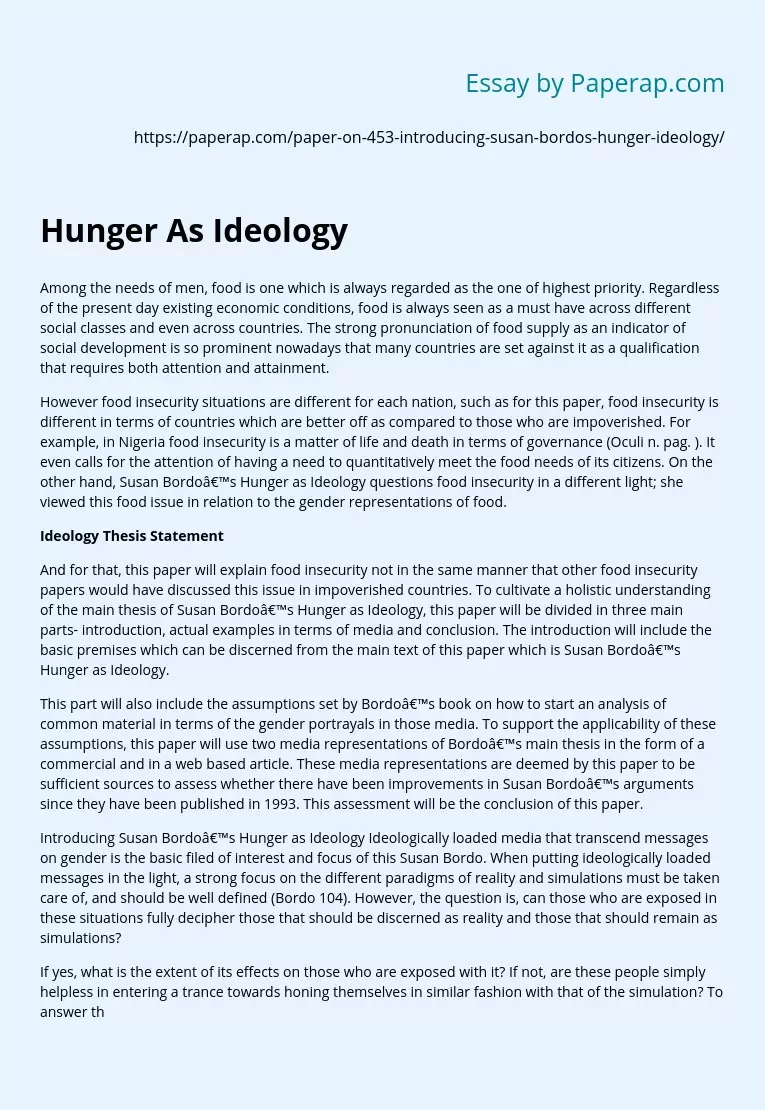Hunger As Ideology
Among the needs of men, food is one which is always regarded as the one of highest priority. Regardless of the present day existing economic conditions, food is always seen as a must have across different social classes and even across countries. The strong pronunciation of food supply as an indicator of social development is so prominent nowadays that many countries are set against it as a qualification that requires both attention and attainment.
However food insecurity situations are different for each nation, such as for this paper, food insecurity is different in terms of countries which are better off as compared to those who are impoverished.
For example, in Nigeria food insecurity is a matter of life and death in terms of governance (Oculi n. pag. ). It even calls for the attention of having a need to quantitatively meet the food needs of its citizens. On the other hand, Susan Bordo’s Hunger as Ideology questions food insecurity in a different light; she viewed this food issue in relation to the gender representations of food.
Ideology Thesis Statement
And for that, this paper will explain food insecurity not in the same manner that other food insecurity papers would have discussed this issue in impoverished countries. To cultivate a holistic understanding of the main thesis of Susan Bordo’s Hunger as Ideology, this paper will be divided in three main parts- introduction, actual examples in terms of media and conclusion. The introduction will include the basic premises which can be discerned from the main text of this paper which is Susan Bordo’s Hunger as Ideology.
This part will also include the assumptions set by Bordo’s book on how to start an analysis of common material in terms of the gender portrayals in those media. To support the applicability of these assumptions, this paper will use two media representations of Bordo’s main thesis in the form of a commercial and in a web based article. These media representations are deemed by this paper to be sufficient sources to assess whether there have been improvements in Susan Bordo’s arguments since they have been published in 1993. This assessment will be the conclusion of this paper.
Introducing Susan Bordo’s Hunger as Ideology Ideologically loaded media that transcend messages on gender is the basic filed of interest and focus of this Susan Bordo. When putting ideologically loaded messages in the light, a strong focus on the different paradigms of reality and simulations must be taken care of, and should be well defined (Bordo 104). However, the question is, can those who are exposed in these situations fully decipher those that should be discerned as reality and those that should remain as simulations?
If yes, what is the extent of its effects on those who are exposed with it? If not, are these people simply helpless in entering a trance towards honing themselves in similar fashion with that of the simulation? To answer these questions, this paper would take a closer look on the main argument of Bordo towards most food advertisements- gender specification. According to Susan Bordo, feminine self restraint and masculine indulgence are the common theme used in commercials to portray the different aspects of food (Descripted lines n. pag. ).
From its preparation, cooking, presentation and the actual process of eating- these roles are said to be portrayed in most food commercials. The value of this paper would put emphasis on the fact that realities and simulations are always and will always be present. Simulations, according to Bordo, even if they are blatantly known as manmade realities still have the power to hone the general mindset of individuals through the ideological load that they have (directessays n. pag. ). One of the most prominent simulations presented by Bordo is the Anglo- American formulation of both beauty and character (directessays n.pag. ).
The most profound meaning of beauty can only be achieved by following the prescribed character in the commercials. Due to this prescription, a systematic analysis of the subliminal messages imminent in commercials should be conducted (Lane n. pag. ). The message aimed to be put into the minds of watchers is usually subliminal in nature. Furthermore, most commercials of this type aim to create and cultivate a certain culture that would change not only the mindset of the individuals but also their choices (Lane n. pag. ).
Hunger As Ideology. (2019, Dec 05). Retrieved from https://paperap.com/paper-on-453-introducing-susan-bordos-hunger-ideology/

